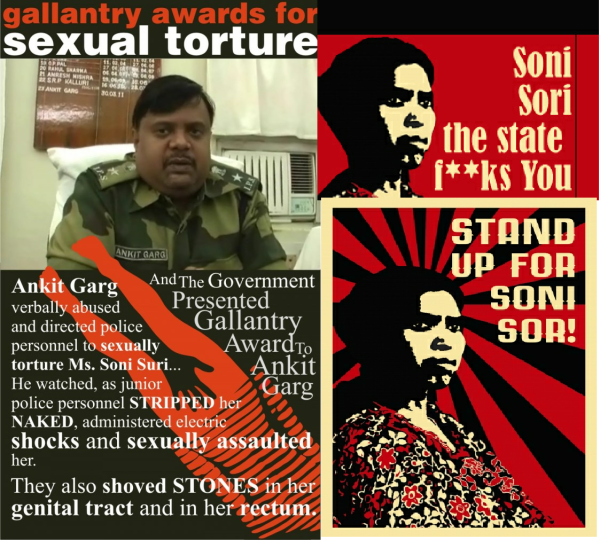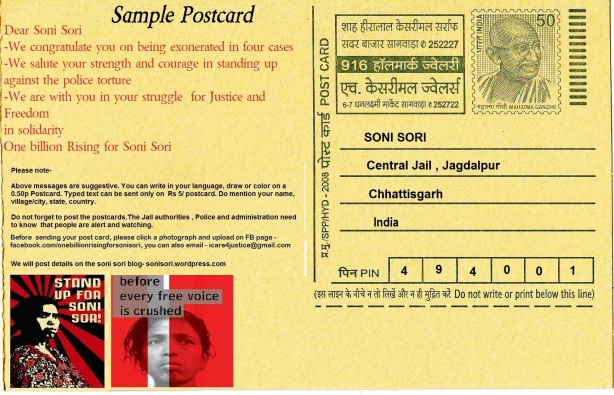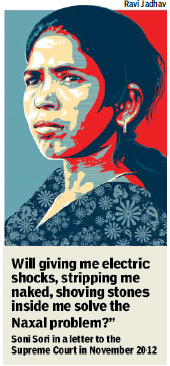Ashutosh Bhardwaj : Newdelhi | Thu Dec 26 2013

Away from their forested home in Dantewada, two alleged Maoists are living in exile in a crowded lane in Delhi. Barred from entering their “motherland” Chhattisgarh, tribal teacher Soni Sori and her nephew Lingaram Kodapi, both accused in the Essar-Maoists payoffs case, spend their days meeting activists, students and readingMarx among other things.
“If you say Lal Salaam or use the word Marx in Chhattisgarh, you will be termed aNaxal and arrested immediately. In Delhi many people say Lal Salaam,” says Sori, 37.
“I am surprised that Marx is taught in colleges here. Arrest all these students,” adds Kodapi, 25.
In Chhattisgarh, Marx is considered to constitute Maoist literature — sufficient evidence for arrest under the stringent Chhattisgarh Special Public Security Act.
After spending over two years in jail, the duo were released after being granted interim bail by the Supreme Court last month. But they were prohibited from entering Chhattisgarh.
“My tragedy is not the jail term. I could have lived with that. Tribals in my region (Bastar) are usually put in jail for no reason. The bigger tragedy is that I lost my motherland. Puri duniya men badnaam ho gayi main (I have been dishonoured in the whole world),” says Sori.
Her two daughters and a son live with her brother in Dantewada. “I cannot go back to my children. Their childhood has been destroyed,” she adds. After being released on bail, Sori was given little time to even meet her children, as she and Kodapi had to leave Chhattisgarh within 24 hours. They now live in the office of their lawyer,Colin Gonsalves. Always accompanied by a guard, they have to report to the nearest police station every week.
“Policemen in Delhi don’t know our case, they taunt us saying that we are notorious Naxals. They say `tumhen chhorna nahi chahiye tha. Supreme Court ne tum par meharbani kar di (you should not have been released. The Supreme Court did you a favour),” says Kodapi.
“It’s not bail. We are still living in a jail,” adds Sori.
These days, Kodapi is watching Steven Soderbergh’s Che, a gift from a British friend. He reads English books and quotes Nelson Mandela.
“The government of India has not done justice to tribals. We never asked for anything. We only want liberation, not reservations. My Constitution gives me the right to equality,” he says.
The duo have been acquitted in all other cases except the Essar-Maoists payoff case. Sori was in jail when her mother died last year. Her husband and co-accused Anil Futane reportedly succumbed to injuries he sustained in jail days after he was acquitted in August this year.
“They granted bail to the Essar general manager and B K Lala (Essar’s contractor), but denied it to us. If the high court had given me bail, I could have gone back to live in my village, but now I have been evicted, without a home,” says Sori.
Essar is alleged to have paid “protection money” to Maoists, and Sori and Kodapi are alleged to have acted as conduits.
Kodapi blames both the security forces and the Maoists. He says while the former wanted him to become a special police officer (SPO), the Maoists also wanted him to join their ranks. He refused both offers, he says.
“Maoists force tribal youths to join them. Several years ago, Badru (a Maoist commander) called me and asked me to fight against the police. I refused. Now, Badru is the police’s man,” he says.
He says the trial has steeled his resolve and “faith in the Constitution and non-violence”. “They have pitted me against myself. When they arrested me, I asked them to kill me, or else I will defeat them. Even if you keep me in jail for 20 years, I will come out and defeat you,” he says.
Read more here- http://m.indianexpress.com/news/this-isn-t-bail-we-are-still-living-in–jail-says-soni-sori–exiled–in-delhi/1211809/










